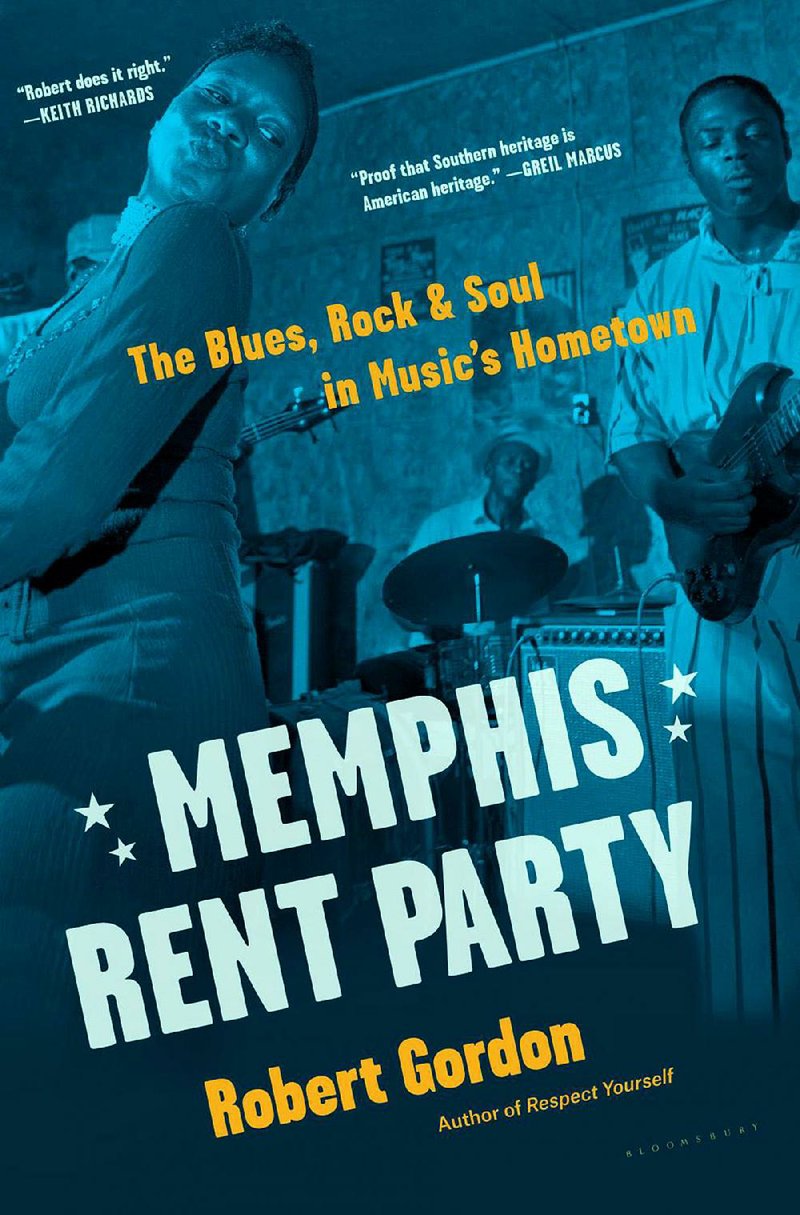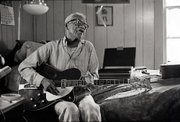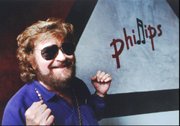When I think of the writer Robert Gordon, I'm reminded of a quote by Lou Reed.
"Well, Faulkner had the South, Joyce had Dublin. I've got New York -- and its environs," the ever modest Reed said in a 1989 interview with Rolling Stone.
And Gordon has Memphis.
Not to say that he writes anything like Joyce or Faulkner, or makes music like Reed made, but since his first book, 1996's loving, revelatory It Came From Memphis, Gordon, who grew up in the Bluff City, has made it his business to take a hard look at his surroundings and chronicle the weird, eccentric undercurrents that pulse through that city and the music and personalities it produces and attracts.
His latest, Memphis Rent Party (Bloomsbury, $28), subtitled The Blues, Rock & Soul in Music's Hometown, is a collection of previously published music journalism and essays along with unpublished pieces connected by their left-of-center pursuit of the offbeat and odd, all written in Gordon's thoughtful, penetrating style.
His enthusiasm and curiosity are contagious, as he reports from the north Mississippi cookouts of fife player Othar Turner, Memphis juke joints, under a bridge or the back of Jerry Lee Lewis' tour bus. His writing is borne of the place, the scene. He isn't pondering his subjects from afar, but is with them, asking questions, listening to their stories, trying to crack the mystery and get to what is really real. He's like his friend and influence Peter Guralnick in this way, not afraid to do the reporting legwork, and he's not really concerned with bona fide stars, but the shoulda-been, coulda-beens who walk among us.
In his preface, Gordon recounts how, as an awestruck teen, he first saw local bluesman Furry Lewis open for the Rolling Stones at a July 4, 1975, concert at the Liberty Bowl in Memphis.
"I think I was familiar with the blues at the time -- Memphis called itself 'home of the blues,'" he writes. "But I hadn't considered that the bluesmen might be alive.
"And still playing.
"In my town."
Witnessing Lewis onstage was one of the rabbit holes through which the young misfit Gordon found the Memphis music underbelly. Another was through his family's black housekeeper, Odessa, who played gospel on the car radio and told him stories of a Memphis far different than the suburban version he knew.
And then there was Arkansas-born producer, musician and underground sage Jim Dickinson.
The second piece in the book is an unpublished, casually rambling interview from 1986 with Dickinson that touches on, among other things, music production, Memphis, Big Star, Alex Chilton, The Replacements and Dickinson's swampy, proto-Southern blooze-rawk outfits Mudboy and the Neutrons.
Gordon, who has also written books on Muddy Waters, Elvis Presley and Stax Records, talks about Dickinson's influence during an interview from his midtown Memphis home.
"You could say that when I heard Furry at the Stones concert, I found the trap door in underground Memphis, and when I heard Mudboy and the Neutrons, I stuck my head through that door and that interview is when I dove in headfirst. After that I was like, everything I could imagine of this sort of nutty, Memphis thing that I'd been observing is true. It's performance art, it's political, it's welcoming and it's also aggressive. It's the real deal. That interview let me know it was going to be as wild as I could have imagined."
. . .
What Gordon realized was that this strain of Memphis and north Mississippi culture was defined most by its rough edges and loose approach, where bum notes played with feeling or less-than-perfect recordings were often favored over crystalline performances.
"It's that whole inverted aesthetic and the pursuit of beautiful amateurism instead of beautiful professionalism, and the appreciation of mistakes," he says. "That goes back to Sam Phillips, and we all know what Sam wrought on the world."
Indeed, Phillips -- the producer and founder of Sun Records, home to Elvis Presley, Johnny Cash, Carl Perkins, et al. -- leads off Memphis Rent Party as Gordon conducts a sort of play-by-play breakdown of Phillips' whacked-out 1986 appearance on Late Night With David Letterman. In the essay "Sam on Dave," which first appeared in the Oxford American in 1997, Gordon takes a sort of gonzo approach, dissecting a tape of the program and positing that Phillips was actually producing Letterman.
"Sam knew what he was doing," Gordon says. "If he was drunk or sober as a church mouse, he went in there to produce David Letterman on national TV. Letterman was just baffled. It's beautiful. It's high art."
The earliest piece in the new collection is also the only non-music-related item. "Mississippi Reverie" is an evocative, unpublished 1985 profile of Ernest Willis, the toothless, retired fisherman and avid runner who lived in a trailer beneath a bridge across from Memphis on the Arkansas side of the Mississippi River.
"That's the oldest writing I had," Gordon says, "I can see where my style had evolved, but it made me feel great because it held up. I hardly had to make any changes."
A 1992 profile of soul singer James Carr for LA Weekly is perhaps the most chilling.
Carr, a remarkable vocalist who had a hit in 1967 with "The Dark End of the Street" ("The version to which all others are compared," Gordon writes) and was for a time revered in Japan and Europe, was scraping by in Memphis when sessions were booked for an attempt at a comeback recording.
Gordon accompanies Carr to the studio, where there are moments of brilliance and darkness. Carr had long suffered from what Gordon says were undiagnosed mental health issues. A 1979 comeback attempt sputtered to a halt when Carr stood onstage at a show in Japan, catatonic, unable to perform.
The published story ends with Gordon loaning some cash to Carr to buy a quart of beer, but this version has an addendum. Gordon has included a sad, chilling transcript of a conversation he had with Carr during his reporting in which Carr, who died in 2001, talks about his belief that his body had been switched with someone else's.
"I sat on that a long time," Gordon says. "When it was happening, that's the exciting part of being this kind of documentarian, you find yourself on these extraordinary moments. You have to float through them and try to figure out what's going on."
. . .
Another chilling portrait is "Very Extremely Dangerous," Gordon's 2014 liner notes essay for a documentary of the same name that he produced about the life of Jerry McGill, the Memphis musician and violent character whose lengthy criminal record was more well-known than his scant few rock 'n' roll records.
Gordon begins by admitting that he made a mistake in his first telephone chat with McGill, a career criminal, convicted felon and junkie with lung cancer and a fondness for knives and sawed-off shotguns -- he gave him his home address. The resulting essay is a glimpse into the madness of McGill's unhinged life.
In all, there are 20 works collected here, most including an updated introduction of sorts.
Gordon dives deep into the hellhounds-on-the-money-trail spurred by the early '90s resurgence of mysterious, long-dead bluesman Robert Johnson. There's a funny, insightful profile of Jerry Lee Lewis from 2005; an illuminating and entertaining interview with musician and performance artist Tav Falco, who grew up near Gurdon; a sober study of Jeff Buckley, who died in 1997 in Memphis; a profile of Charlie Feathers, the last of the rockabillies; and a clear-eyed remembrance of the truculent Chilton, who sang on '60s chart hits with the Box Tops, was a co-founder of power pop heroes Big Star and made an eclectic string of solo albums before his death in 2010.
There's also a fun, wildly honest interview with Chan Marshall, who records as Cat Power, and a heretofore unpublished story about Mama Rose Newborn, the mother of jazz siblings Phineas and Calvin Newborn.
In the preface to his liner notes for the 1998 Othar Turner and the Rising Star Fife and Drum Band album Everybody Hollerin' Goat, Gordon ponders matters of violence and his own role in attracting clueless outsiders to what was once an insular scene. Later, on another set of liner notes, he tells the story of Memphis barroom soul-blues legends The Fieldstones.
As with It Came From Memphis, ... Rent Party is accompanied by a handy-dandy companion album and includes tracks from most of the musicians in the book. The record captures the sounds that have enthralled Gordon since that fateful day on the field of the Liberty Bowl, when Furry Lewis' blues introduced him to his hometown.
Style on 03/25/2018



